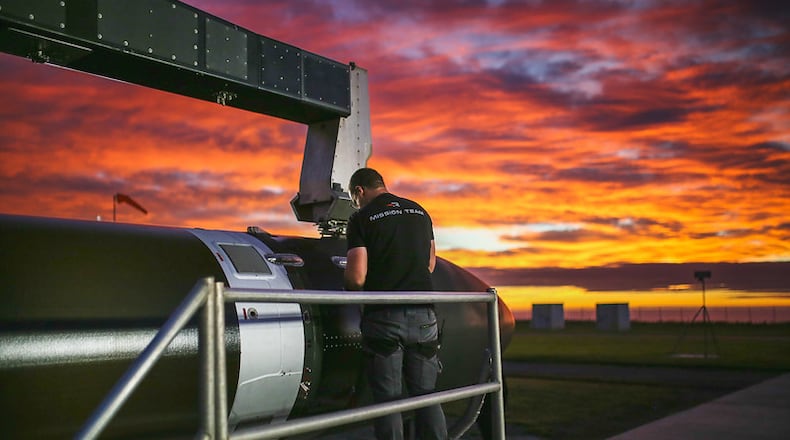The contract will have the Neutron launcher perform a “survivability experiment” under the AFRL Rocket Experimentation for Global Agile Logistics (REGAL) contract solicitation, an effort by the Department of Defense to create a rocket-based “point-to-point transportation system to deliver cargo around the world with commercial launch providers,” the Long Beach company said.
In the experiment, Neutron will re-enter Earth’s atmosphere, demonstrating re-entry capability, Rocket Lab said.
AFRL has explored the possibilities of reusable rockets for about four years, said Dan Brown, principal aerospace engineer and rocket cargo program manager for AFRL.
The lab envisions launching from traditional launch sites, such as California or Florida, to other locations on Earth, Brown said in an interview.
“We’re not looking to deliver to the moon,” he said. “That’s for others.”
Neutron is a medium-lift reusable launch vehicle meant to serve government and commercial customers. It can lift 13,000 kg, or more than 28,600 pounds, to low Earth orbit, according to Rocket Lab.
The principal advantage of commercially available reusable rockets is cost. While a rocket flight is more expensive than flying a C-17, for example, it’s also faster. And the more a reusable rocket is flown, the lower that cost becomes.
That lower cost, measured in dollars per kilogram of cargo to orbit, has sparked some ideas among AFRL and DOD decision-makers.
“There are a lot of challenges here. And we don’t claim this is a be-all, end-all for transportation,” Brown said. “Aircraft didn’t replace ships. We still use ships today.”
But he added: “There are cases where having the speed and capacity of a rocket is advantageous both for the commercial and the DOD (Department of Defense) side.”
Rockets won’t be suitable for every mission or every payload, Brown said.
What’s unique now is some companies are starting to find ways to reuse a rocket’s second stage — typically expended in orbit or burned up in the atmosphere —and bring down cargo down in different ways, with “re-entry capsules,” for example.
Brown compared the experiment to “exploring the capabilities of a Fed Ex truck” — albeit one that can reach outer space.
He declined to discuss payload or cargo. For the moment, “What’s inside is sort of irrelevant.”
“If you can fit your cargo in the box, you can move it,” he added.
Rocket Cargo was founded in 2021.
“Neutron is a powerful new launch option that will set a new standard for performance, affordability, and reliability for government and commercial space users in medium launch,” Rocket Lab founder and Chief Executive Peter Beck said in a statement. “This opportunity for the U.S. Air Force not only helps to advance space logistics, it also demonstrates a high degree of confidence by the DOD in Neutron’s capabilities.”
About the Author


